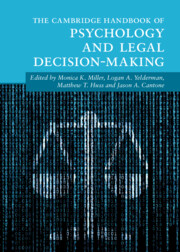Book contents
- The Cambridge Handbook of Psychology and Legal Decision-Making
- Cambridge Handbooks in Psychology
- The Cambridge Handbook of Psychology and Legal Decision-Making
- Copyright page
- Dedication
- Contents
- Figures
- Tables
- Editors
- Contributors
- Part I Introduction Chapters
- Part II Pretrial Phase Decision-Making
- Part III Trial Phase Decision-Making
- Part IV Postconviction Phase Decisions
- Part V Other Legal Decision-Making
- Part VI Perspectives from the Field
- 44 Culturally Competent Perspectives and a Legally Literate Practice Promote Quality Decisions in Social Work
- 45 Making Probation Decisions in the Real World
- 46 Justice for All
- 47 Police Officer Decisions in Interrogations and Investigations
- 48 Restoration
- 49 To Tell or Not To Tell: Is That The Question?
- 50 Diversity in Legal Decision-Making
- Part VII Conclusion
- Index
- References
46 - Justice for All
Reflections as a Clinician at the Intersections
from Part VI - Perspectives from the Field
Published online by Cambridge University Press: 22 February 2024
- The Cambridge Handbook of Psychology and Legal Decision-Making
- Cambridge Handbooks in Psychology
- The Cambridge Handbook of Psychology and Legal Decision-Making
- Copyright page
- Dedication
- Contents
- Figures
- Tables
- Editors
- Contributors
- Part I Introduction Chapters
- Part II Pretrial Phase Decision-Making
- Part III Trial Phase Decision-Making
- Part IV Postconviction Phase Decisions
- Part V Other Legal Decision-Making
- Part VI Perspectives from the Field
- 44 Culturally Competent Perspectives and a Legally Literate Practice Promote Quality Decisions in Social Work
- 45 Making Probation Decisions in the Real World
- 46 Justice for All
- 47 Police Officer Decisions in Interrogations and Investigations
- 48 Restoration
- 49 To Tell or Not To Tell: Is That The Question?
- 50 Diversity in Legal Decision-Making
- Part VII Conclusion
- Index
- References
Summary
I write from the perspective of a Black woman who is a first-generation American and a clinically trained psychologist. I practice at the intersection of the public mental health and criminal justice systems, as a public sector forensic evaluator. I additionally function as university faculty, tasked with educating and training forensic mental health professionals early in their forensic careers. I carry my identities and roles with me in my daily practice, where decision-making becomes tangled in systems that have multiple and at times competing functions, agendas, resources, and responsibilities.
- Type
- Chapter
- Information
- The Cambridge Handbook of Psychology and Legal Decision-Making , pp. 687 - 691Publisher: Cambridge University PressPrint publication year: 2024

